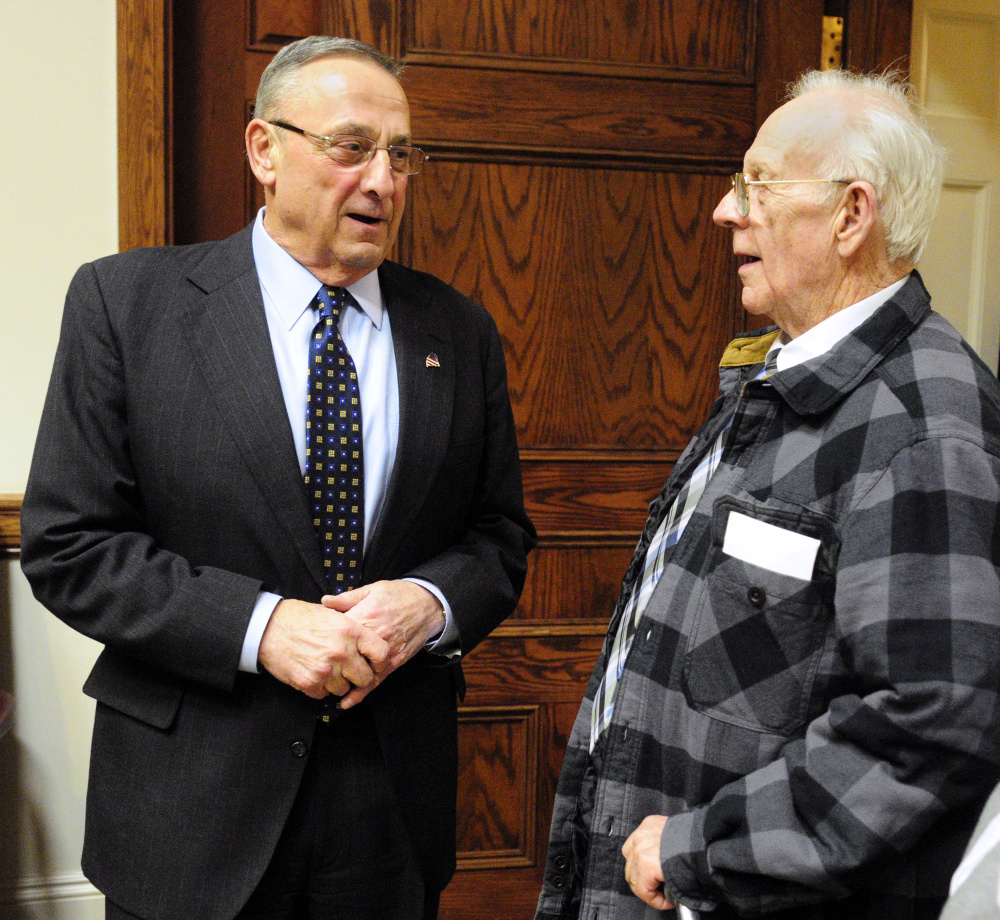It shouldn’t have ended this way for the Sukeforths, an elderly couple from Albion who lost their home when they didn’t pay property taxes. Misunderstandings, bad health, economic realities and a little bureaucratic intransigence all played a role in creating an outcome that happens certainly more than it should, and which should be prevented whenever possible.
Gov. Paul LePage agrees, and has introduced a bill inspired by the Sukeforths’ plight with the aim of making it less likely such as thing happens again.
But if the governor is so concerned with senior citizens and their housing problems, there’s more he can do than just helping this one couple.
TOWN FORECLOSURE
The town of Albion foreclosed on the home of Richard and Leonette Sukeforth, both in their 80s, in December 2015. The couple’s annual property tax bill was $800, and they owed $4,000 when the town took action.
The Sukeforths’ grown children didn’t realize the trouble their parents were in until they saw an ad that the property was for sale by the town. A concerned neighbor called the governor, who personally went to bat for the Sukeforths, as did family and friends who offered to pay back taxes.
But the town said it was too late, since the property had already been listed for sale, the last step in the long process of municipal foreclosure. The neighbor submitted a bid for the property, with the intent of keeping it for the Sukeforths, but came up short, and the new owner eventually evicted the couple.
That’s the outcome that led LePage to hint that the town was corrupt and say that “the state of Maine turns its back on the elderly.”
But that’s not the whole story.
PROCESS TOOK OVER
Yes, the town foreclosed on the property, but only after giving the Sukeforths plenty of opportunities to make it right. Officials sent notices and stopped by the home. A letter telling the Sukeforths that the foreclosure had gone through and they had time to pay the back taxes and keep the home went unanswered.
Family members, too, were concerned, and asked Richard Sukeforth if he was paying his taxes; he told them he was.
And after the sale, the new owner said he offered to allow the couple to stay if they paid rent, but they didn’t, so he moved forward with the eviction.
Leonette Sukeforth was suffering from serious health problems, family members said, and Richard seems to be dealing with the beginning stages of dementia. It may have looked like willful refusal to town officials, but it’s more likely the couple was confused, or overwhelmed. By the time anyone really realized what was going on, the process had taken over.
MORE TIME, OPTIONS
That is not uncommon. People surviving on very low incomes often have to choose which bills to pay, and over time they get behind. An emergency — a broken-down car, a new medication, a rusted-out furnace — only makes matters worse.
Letters from the town about property taxes may be just one of many late notices, and by the time they realize how serious the situation is, it’s too late — the town, which has policies in place to follow and taxes it has a duty to collect, feels it has to move forward.
LePage’s bill, L.D. 1629, carried over from the last session and scheduled to be reviewed in January, slows down the process and gives more rights to homeowners. But it also places more of a burden on municipalities, and possibly on other taxpayers.
Those issues can be ironed out in committee, and lawmakers should find a way to give seniors with overdue tax bills more options for staying in their homes, or at least the ability to save the equity they have built up through years of mortgage payments.
It makes little sense for people to lose their homes for a small tax bill when they own them outright, or for towns to kick low-income Mainers out of their homes when that only means they’ll need more public assistance.
But there are also wider problems that have gone unaddressed for too long.
WIDER PROBLEMS
There are nearly 10,000 senior households in Maine on waiting lists for affordable housing. That number will grow in the coming years as low-income seniors age out of their homes — the steep stairs, heating bills and snow-packed driveways too much for them.
Some of them, if they can get weatherization and home-based care, will be able to stay longer. Others will need subsidized housing, some of that connected to aging-related services.
Stop if you’ve heard that before — it is the constant refrain of senior and housing advocates who see the reality on the ground. Maine has a pressing and growing need, and not enough is being done.
Voters approved a modest $15 million bond that would have leveraged $20 million in other funds and helped create 225 units of senior housing and allowed for weatherization of some homes, but LePage refused to issues the bonds and a bill in the Legislature to force the issue failed.
Now that will have to wait at least until 2018. The governor found a sympathetic cause in the Sukeforths, but apparently he can’t see that there are many others like them who could use his help.
Send questions/comments to the editors.



Success. Please wait for the page to reload. If the page does not reload within 5 seconds, please refresh the page.
Enter your email and password to access comments.
Hi, to comment on stories you must . This profile is in addition to your subscription and website login.
Already have a commenting profile? .
Invalid username/password.
Please check your email to confirm and complete your registration.
Only subscribers are eligible to post comments. Please subscribe or login first for digital access. Here’s why.
Use the form below to reset your password. When you've submitted your account email, we will send an email with a reset code.